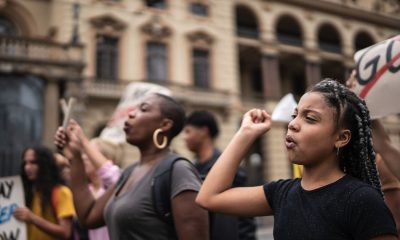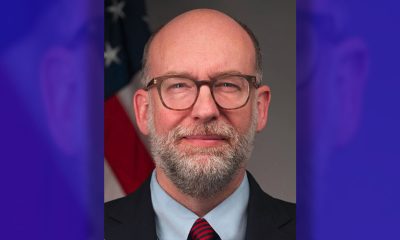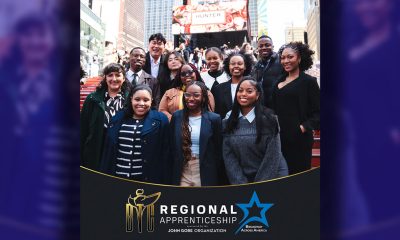Activism
Three California Cities Push Plans to Increase Police Spending
The Police Commission has not moved on the proposed budget and the LAPD needs the City Council’s approval before it can go into effect. On the other hand, and separate from the $67 million requested by LAPD, Mayor Eric Garcetti has proposed a $50 million increase in the police budget, much to the dismay of members of the Los Angeles Black Lives Matter organization.

It has been over 13 months since police in Kentucky killed Breonna Taylor, and just shy of a year since Minneapolis police officer Derek Chauvin murdered George Floyd.
These high-profile deaths of African Americans, along with many others, sparked global protests and resulted in politicians and activists on the political Left calling on their cities and. counties to defund their police departments.
More precisely, many of are pushing their elected officials to reallocate money in police budgets to more social service-oriented interventions in efforts to reduce the number of violent police encounters.
But some cities in California — Sacramento, San Diego and Los Angeles — are planning to do just the opposite.
From 2019 to 2020, Sacramento’s approved police budget saw an increase of over $7 million. This year, California’s capital city will spend a record $165.8 million on police, a $9.4 million increase.
However, Sacramento Mayor Darrell Steinberg says, by mid-2022, at least $10 million will be directed away from the police department toward the Department of Community Response.
“I’m not for ‘defunding,’” Steinberg told the Sacramento Bee. “There are some things that are part of running a city, like collective bargaining and binding arbitration, and genuine needs for the police department.”
“I’m not going to get pinned to the argument that the measure of whether or not we are investing in the community in an aggressive way is whether or not we’re taking the money directly from the police department,” he continued.
In San Diego, the city is planning to raise the police budget for the 11th year in a row.
San Diego Mayor Todd Gloria proposed a 3% increase for police spending next year, meaning that the police budget has ballooned by a total of 52% since 2008.
The city is introducing that increase with a decrease in library hours in an effort to offset those costs.
San Diego City Council President Georgette Gómez says that she planned to cut the police budget, but former Mayor Kevin Faulconer would have vetoed that measure.
Gloria has expressed interest in reducing police spending over time also, but activists insist that more needs to be done.
In Los Angeles, after two reports from the Los Angeles City Council and the Los Angeles Board of Police Commissioners admonished the Los Angeles Police Department (LAPD) for their mishandling of several protests over the past year, the LAPD has nevertheless announced that it wants a $67 million increase in its budget to contend with the costs of protest response reform alone.
During various protests in the summer of 2020, police made over 3,000 arrests with little to no accommodations for those arrested.
Police Chief Michel Moore admitted the protest response could have been handled better but asserted that most of his officers responded the way they did because of their training.
“While there were missteps and shortfalls in communication and command and control, especially from senior staff in the field, the vast majority of personnel performed admirably with their ongoing efforts to tirelessly serve the city, even in the face of antagonistic and violent crowds,” Moore wrote in a letter to the board of commissioners.
This proposed budget increase will be going toward salaries and overtime for extended training, according to Deputy Chief Dominic Choi.
The Police Commission has not moved on to the proposed budget and the LAPD needs the City Council’s approval before it can go into effect. On the other hand, and separate from the $67 million requested by LAPD, Mayor Eric Garcetti has proposed a $50 million increase in the police budget, much to the dismay of members of the Los Angeles Black Lives Matter organization.
While a couple of these budget proposals are still being deliberated and wouldn’t fully go into effect until next year, they are far cries from defunding the police.
Despite a growing chorus of voices against it, more Golden State taxpayer money will likely go toward increased funding for “California’s finest.”
Activism
Oakland Post: Week of November 26 – December 2, 2025
The printed Weekly Edition of the Oakland Post: Week of November 26 – December 2, 2025

To enlarge your view of this issue, use the slider, magnifying glass icon or full page icon in the lower right corner of the browser window.
Activism
Oakland Post: Week of November 19 – 25, 2025
The printed Weekly Edition of the Oakland Post: Week of November 19 – 25, 2025

To enlarge your view of this issue, use the slider, magnifying glass icon or full page icon in the lower right corner of the browser window.
Activism
IN MEMORIAM: William ‘Bill’ Patterson, 94
Bill devoted his life to public service and education. In 1971, he became the founding director for the Peralta Community College Foundation, he also became an administrator for Oakland Parks and Recreation overseeing 23 recreation centers, the Oakland Zoo, Children’s Fairyland, Lake Merritt, and the Henry J. Kaiser Convention Center.

William “Bill” Patterson, 94, of Little Rock, Arkansas, passed away peacefully on October 21, 2025, at his home in Oakland, CA. He was born on May 19, 1931, to Marie Childress Patterson and William Benjamin Patterson in Little Rock, Arkansas. He graduated from Dunbar High School and traveled to Oakland, California, in 1948. William Patterson graduated from San Francisco State University, earning both graduate and undergraduate degrees. He married Euradell “Dell” Patterson in 1961. Bill lovingly took care of his wife, Dell, until she died in 2020.
Bill devoted his life to public service and education. In 1971, he became the founding director for the Peralta Community College Foundation, he also became an administrator for Oakland Parks and Recreation overseeing 23 recreation centers, the Oakland Zoo, Children’s Fairyland, Lake Merritt, and the Henry J. Kaiser Convention Center.
He served on the boards of Oakland’s Urban Strategies Council, the Oakland Public Ethics Commission, and the Oakland Workforce Development Board.
He was a three-term president of the Oakland branch of the NAACP.
Bill was initiated in the Gamma Alpha chapter of Kappa Alpha Psi Fraternity.
In 1997 Bill was appointed to the East Bay Utility District Board of Directors. William Patterson was the first African American Board President and served the board for 27 years.
Bill’s impact reached far beyond his various important and impactful positions.
Bill mentored politicians, athletes and young people. Among those he mentored and advised are legends Joe Morgan, Bill Russell, Frank Robinson, Curt Flood, and Lionel Wilson to name a few.
He is survived by his son, William David Patterson, and one sister, Sarah Ann Strickland, and a host of other family members and friends.
A celebration of life service will take place at Henry J. Kaiser Convention Center (Calvin Simmons Theater) on November 21, 2025, at 10 AM.
His services are being livestreamed at: https://www.facebook.com/events/1250167107131991/
In lieu of flowers, donations can be made to the Euradell and William Patterson scholarship fund TBA.

-

 Activism3 weeks ago
Activism3 weeks agoOakland Post: Week of November 12 – 18, 2025
-

 Activism4 weeks ago
Activism4 weeks agoOakland Post: Week of November 5 – 11, 2025
-

 Activism2 weeks ago
Activism2 weeks agoIN MEMORIAM: William ‘Bill’ Patterson, 94
-

 Activism3 weeks ago
Activism3 weeks agoHow Charles R. Drew University Navigated More Than $20 Million in Fed Cuts – Still Prioritizing Students and Community Health
-

 #NNPA BlackPress3 weeks ago
#NNPA BlackPress3 weeks agoThe Perfumed Hand of Hypocrisy: Trump Hosted Former Terror Suspect While America Condemns a Muslim Mayor
-

 Bay Area3 weeks ago
Bay Area3 weeks agoNo Justice in the Justice System
-

 #NNPA BlackPress3 weeks ago
#NNPA BlackPress3 weeks agoProtecting Pedophiles: The GOP’s Warped Crusade Against Its Own Lies
-

 #NNPA BlackPress2 weeks ago
#NNPA BlackPress2 weeks agoTrump’s Death Threat Rhetoric Sends Nation into Crisis

























































